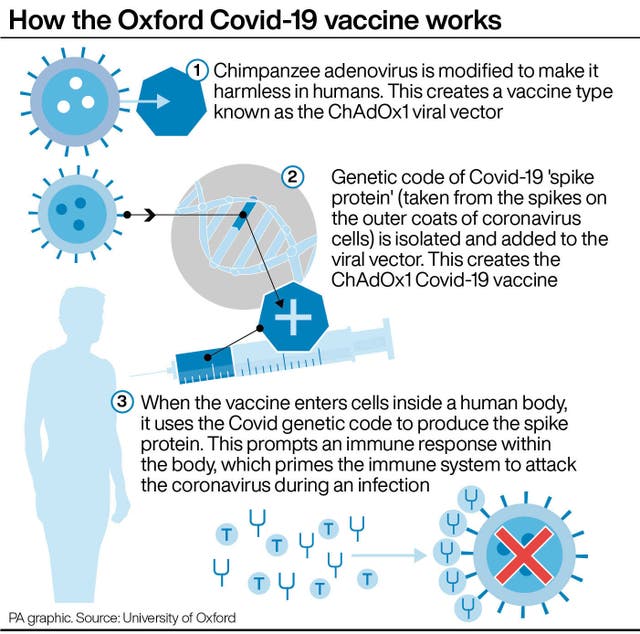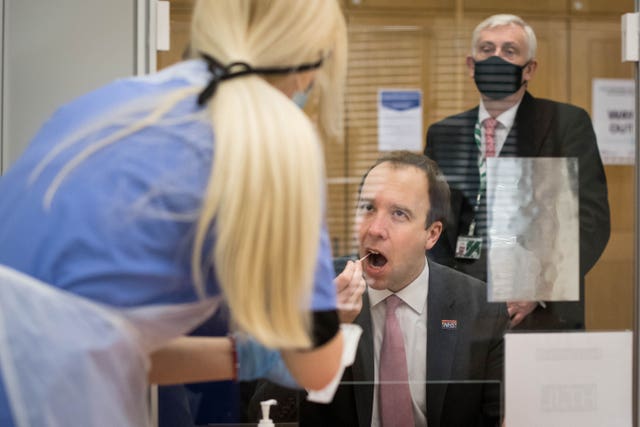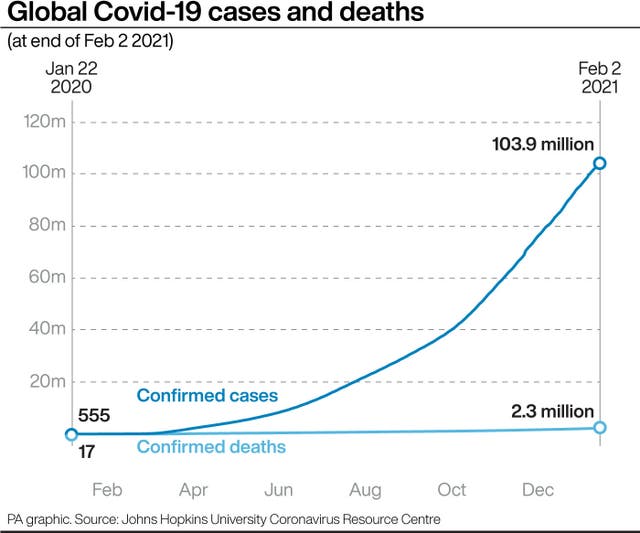Vaccines against Covid variants will be ready by autumn – AstraZeneca
Studies suggest that new variants of coronavirus reduce the effectiveness of vaccines.

Vaccines against new coronavirus variants should be ready by October, the team behind the Oxford University/AstraZeneca jab has said.
In a media briefing hosted by AstraZeneca, Professor Andrew Pollard, director of the Oxford Vaccine Group, said work on designing a new vaccine could be completed rapidly.
It comes after studies have shown that variants of coronavirus with the worrying E484K mutation could make vaccines less effective, though they are still expected to offer good protection against illness and severe disease.

The mutation is found in the South African variant of the virus, which has prompted surge-testing in eight postcode areas of England where community transmission is feared.
It has also been detected in Bristol in the variant first identified in Kent, and in Liverpool in a new variant of the original pandemic strain.
Prof Pollard said: “I think the actual work on designing a new vaccine is very, very quick because it’s essentially just switching out the genetic sequence for the spike protein, for the updated variants.
“And then there’s manufacturing to do and then a small-scale study.
“So all of that can be completed in a very short period of time, and the autumn is really the timing for having new vaccines available for use rather than for having the clinical trials run.”
Sir Mene Pangalos, executive vice president of biopharmaceuticals research and development at AstraZeneca, said: “Our ambition is to be ready for the next round of immunisations that may be necessary as we go into next winter. That’s what we’re aiming for.”
He continued: “We’re very much aiming to try and have something ready by the autumn. So, this year.”
Prof Pollard said it is likely that clinical trials on new vaccines for dealing with the variants of Covid-19 will involve “hundreds” of people at the most.
“That’s a discussion which is ongoing with regulators about exactly what the data package is that they would need,” he said.
“The reason why it’s such a small number is because, with an updated vaccine, the question is whether immune responses still look the same but against the new variants as they emerge.
“We don’t need to run studies on a large scale to prove efficacy. And so that’s why they’re much quicker and much smaller to conduct.”
Prof Pollard also told the briefing that social distancing needs to continue for now, despite Oxford’s analysis showing a substantial effect on transmission.

Earlier, he said vaccines in general should still protect against severe disease.
“I think one of the things that we know about these new variants is that they are making changes that allow them to avoid human immune responses so that they can still transmit,” he told BBC Breakfast.
“So that does mean that it’s likely over time that the virus will find ways of adapting and continue to pass between people despite natural infection and immunity after that or from the vaccines.
“That doesn’t mean that we won’t still have protection against severe disease, because there’s lots of different ways in which our immune system fights the virus – it is much more about the virus being able to continue to survive, rather than for it to cause harm to us.”
It comes as:
– Health Secretary Matt Hancock said more than 10 million people had now received their first dose of a coronavirus vaccine.
– Social distancing may need to continue until spring 2022 even with effective coronavirus vaccines, Paul Hunter, professor in medicine at the University of East Anglia (UEA), has said.
– An outbreak of coronavirus has been confirmed at the Valneva vaccine site in Livingston, Scotland, which was visited by Boris Johnson last week.
– Baroness Dido Harding, head of NHS Test and Trace, told MPs that around 20,000 people a day contacted by the system are not fully complying with instructions to self-isolate.
– The Prime Minister has encouraged members of the public to clap for Captain Sir Tom Moore at 6pm on Wednesday. The 100-year-old, who raised almost £33 million for NHS charities by walking laps of his garden, died with coronavirus in Bedford Hospital on Tuesday.
In a round of broadcast interviews on Wednesday, Health Secretary Matt Hancock said data from Oxford showing its vaccine could substantially cut transmission and “will help us all to get out of this pandemic”.
He hailed the new analysis as “absolutely superb” after results showed the jab offers 76% protection up to three months after the first dose and could reduce transmission.
Cutting transmission is the key to lifting the most severe restrictions of lockdown more quickly and means infection levels could come down faster than they would otherwise.
Mr Hancock told BBC Breakfast: “We know from earlier trials that the vaccines are safe and effective at protecting the individual.

“We now know that the Oxford vaccine also reduces transmission and that will help us all to get out of this pandemic, frankly, which is why it is such good news that we should welcome.”
Mr Hancock told Times Radio that the number of people in hospital is coming down and deaths will drop.
He said the Oxford data means “we can have a high degree of confidence that that will come down quickly”.
He also said data showing that delaying the second dose of the vaccine by up to 12 weeks could increase its efficacy “categorically” supports the Government’s strategy of stretching the time limit between doses.
“This Oxford report is very good news, it backs the strategy that we’ve taken and it shows the world that the Oxford vaccine works effectively,” he told Sky News.





